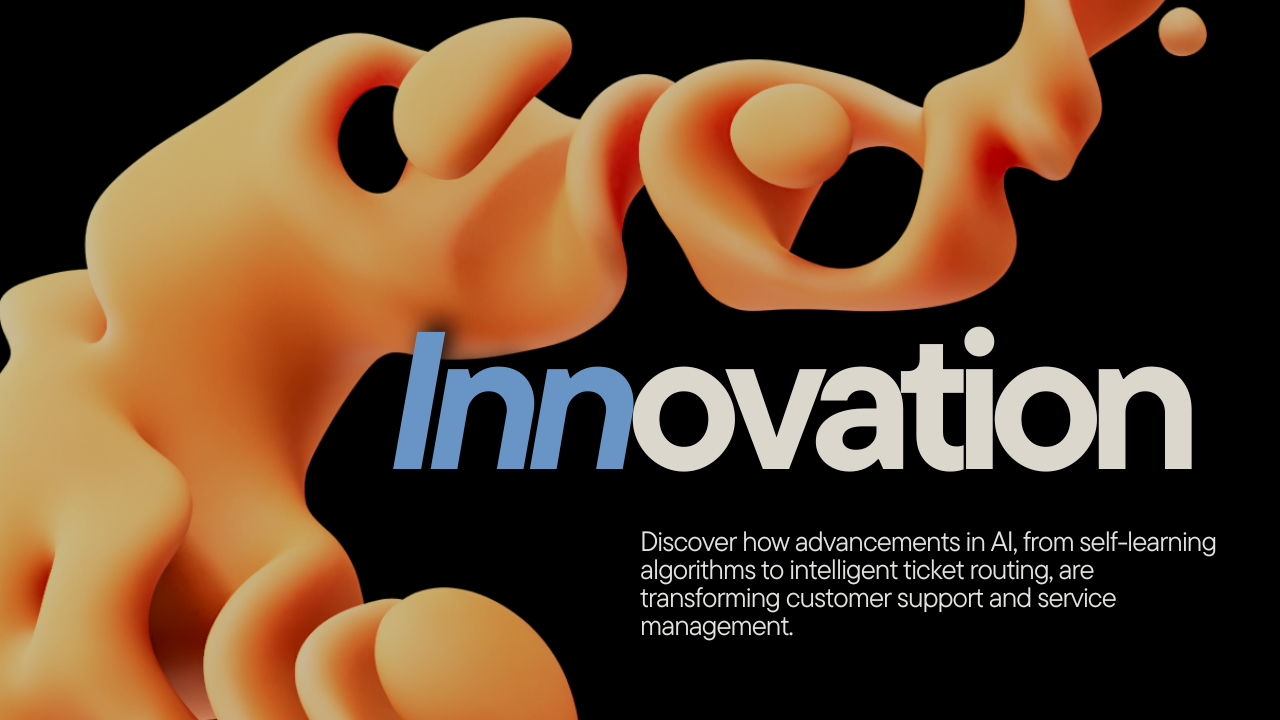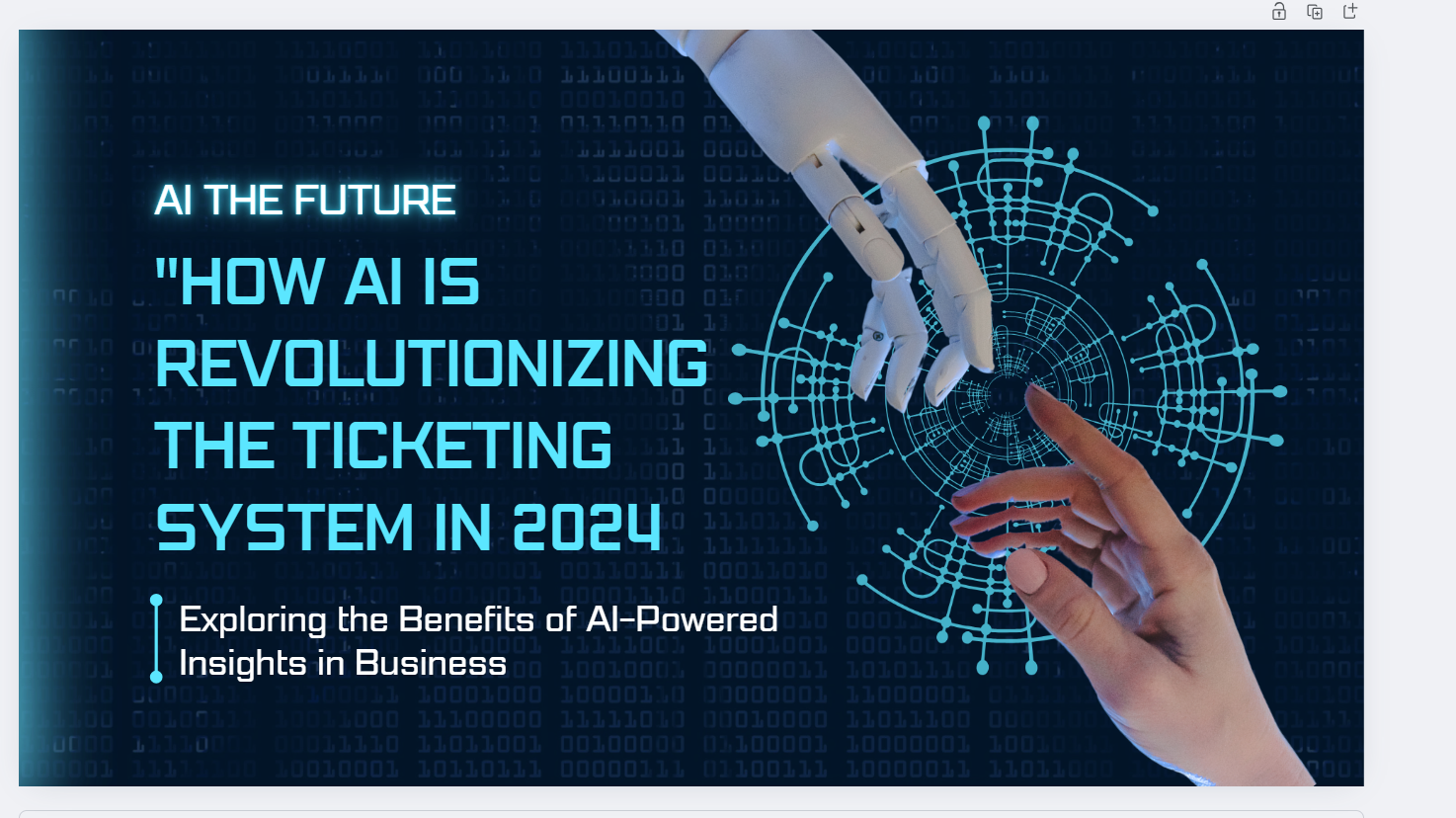Introduction
Modern fast-paced customers expect quick support and a flawless experience. Traditional ticketing mechanisms, though consistent, have become archaic in the present, highly rising needs of contemporary enterprises. AI-powered ticketing can emerge as a broad solution for fast, accurate, and customized management of client queries. There is no need to emphasize how valuable it is to meet the new needs of contemporary companies.
The benefits of using AI for ticket management. The reasons why businesses use it and how AI has transformed ticket management in the modern day are all covered in this article. Artificial intelligence alters how societies handle support requests and offers flexible experiences whether your goal is to save costs increase agent effectiveness or boost customer pleasure.
What is AI-powered ticketing?
AI-powered ticketing refers to using Artificial Intelligence and Machine Learning technologies to automate and enhance the support system. AI-powered systems analyze and process incoming tickets intelligently, enabling faster resolution and improved customer experience. These systems use advanced technologies like natural language processing to understand customer inquiries and automatically classify and assign tickets to the right agents or departments.
Components of AI-Powered Ticketing
- Artificial Intelligence: AI is responsible for the automation of ticketing, enabling the solution of intelligent problems and the taking of decisions.
- Machine Learning: To improve performance over time, such as by anticipating trends and suggesting solutions, automatic learning helps systems extract lessons from historical ticket data.
- Natural Language Processing: By following customer sentiment and understanding the context of their demands, natural language processing systems provide personalized service.
- Ticket Triage and Routing: AI algorithms classify tickets based on urgency, intent, and sentiment, ensuring they are routed to the most suitable digital agent.
- Chatbots and Digital Agents: AI-powered chatbots handle repetitive tickets, providing instant responses to FAQs and common issues and reducing the workload for humans.
How AI-Powered Ticketing Differs from Traditional Ticketing Systems
Traditional ticketing systems rely heavily on manual processes, which can be time-consuming. Agents must read and assign tickets manually ticketing systems automate these tasks, offering the following advantages.
- Efficiency: AI systems process large volumes of support requests in real-time, reducing ticket resolution times.
- Personalization: AI-powered tools analyze customer sentiment and interaction history, enabling tailored responses.
- Scalability: AI systems can handle high volumes of requests during peak periods without sacrificing quality.
- Cost Reduction: Automation lowers operational costs by minimizing the need for additional staff, especially during busy seasons.
- Data Insights: AI provides actionable insights from customer interactions, helping businesses optimize processes and improve service quality.

Top Benefits of Using AI for Ticket Management
1. Enhanced Efficiency: Automated Ticket Triage and Prioritization
AI ticketing systems leverage artificial intelligence and natural language processing to automate ticket triage and prioritization. Through intent detection and sentiment analysis, incoming support requests are sorted and routed to the most suitable agent or department. This not only simplifies ticket management but also boosts agent productivity by eliminating boring tasks.
2. Improved Customer Satisfaction: Faster Resolutions and Personalized Support
With the integration of AI-powered ticketing and chatbots, businesses can resolve tickets faster and provide personalized support. Digital agents ensure 24/7 assistance for boring issues, while ticket management tools help agents focus on complex cases. These features significantly enhance the customer experience and reduce wait times, resulting in higher customer satisfaction rates.
3. Cost Savings: Reducing Operational Costs with Bots and Automation
Through the use of automated ticketing systems, businesses can significantly lower operational costs since digital agents can handle large volumes of tickets without any increase in headcount. The AI algorithms answer common queries and give correct responses by pulling the data from the knowledge base.
4. Scalability: Adapting to Growing Customer Demands Effortlessly
These seasonal peaks, such as those seen during the holidays, usually put a strain on the companies’ ability to respond to customer inquiries fast enough. It leads to long waiting times and generally frustrated customers. But picture a system that can immediately sort and prioritize such a deluge of requests to channel them correctly to the right team or person. This would increase the efficiency of handling larger volumes of work by ensuring that customers receive timely, pertinent support, even in peak times.
5. Data-Driven Insights: Leveraging Predictive Analytics for More Intelligent Decisions
Imagine a system that reads all your support requests, figures out what you need help with and how urgent it is, and then sends the request to the right person or team. That keeps things organized and allows the support team to concentrate on the trickiest problems, not getting bogged down in simple requests.

How AI Solves Traditional Ticketing Challenges
1. Handling Repetitive Tickets
One of the biggest challenges in traditional ticketing systems is managing boring tickets, which consume more time and resources. With AI-powered ticketing businesses can automate responses to frequently asked questions through chatbots and digital agents. These tools pull information from the knowledge base to provide accurate, real-time solutions.
2. Consistent Brand Voice Across Responses
It can be tough to maintain a consistent brand voice in responses when several agents are handling tickets, which are done manually. AI ensures brand voice consistency by using predefined response templates and natural language processing to generate responses that precisely match a company’s tone and style. This increases the customer experience.
3. Challenges of Manual Ticket Routing and Triage
Traditional ticketing systems are most often based on manual processes for routing and triaging tickets, resulting in inefficiencies and delays. AI ticketing systems utilize intent detection and sentiment analysis to automatically classify and prioritize tickets. This prevents errors, reduces response times, and makes sure the tickets are forwarded to the right agents. This way, a business can more appropriately deal with support requests while improving both customer satisfaction and agent productivity.
Real-World Applications of AI Ticketing
Examples from Industries
- Travel and Hospitality
AI ticketing systems streamline support requests such as booking changes, cancellations, and travel inquiries. With machine learning and predictive analytics, these systems can anticipate customer needs, offering personalized suggestions and improving the overall customer experience. - Healthcare
AI-driven ticketing improves patient support through efficient routing of appointment requests, insurance queries, and follow-ups. The accuracy of natural language processing—NLP—lets the system understand the patient’s concern; intent detection assures speedy ticket triage. - Retail and E-Commerce
Retail AI ticketing systems handle the huge bulk of queries during sales events. From order tracking to return requests, digital agents provide instant responses for smooth customer interactions. Sentiment analysis shows customer satisfaction. - Education
Educational institutions leverage AI ticketing for managing student queries such as course registrations and campus services. Automated workflows ensure timely responses, enhancing the student experience. - Human Resources
AI ticketing systems help HR teams manage employee queries related to leave requests, benefits information, and onboarding processes. This frees up the HR team to concentrate on strategic workforce management by automating repetitive tasks.
Implementing AI Ticketing in Your Business
Tools and Platforms to Consider
- Choose platforms that have strong AI algorithms, for example, intelligent workflows, and chatbots.
- Look for solutions that integrate well with your existing customer service software and offer features like ticket triage and predictive analytics.
Tips for Seamless Integration
- Start with a clear understanding of your business needs and identify areas with high ticket volumes.
- Train your AI tools with appropriate data, so the ticket resolution accuracy is guaranteed.
- Make the onboarding process a team effort and get them accustomed to an AI-powered ticketing system.
- Regularly monitor and refine your system to maintain efficiency and scalability.

Future of AI in Ticket Management
Emerging Trends
-
- Predictive Analytics: Using historical data to anticipate customer behavior and ticket volumes, enabling proactive support.
- Conversational AI: Advanced chatbots that understand complex queries and deliver human-like response.
- Workforce Management: AI optimizing staffing needs based on ticket inflow patterns.
Preparing Your Business for AI-Driven Support Systems
- Invest in employee training to adapt to AI-driven processes.
- Focus on building a broad knowledge base to underpin AI capabilities.
- Keep up with industry trends to integrate the latest innovations in your ticketing system.
Conclusion
AI-driven ticketing systems are now revolutionizing customer support with enhanced efficiency, scalability, and personalized experiences. Be it healthcare, retail, or education, adopting AI will transform your processes for managing tickets, reduce operational costs, and enhance the experience of both customers and employees.
Call to Action: Embrace AI-driven ticketing solutions today to stay ahead in a competitive market and meet the growing demands of your customers.
Frequently Asked Questions (FAQs)
What is an AI ticketing system?
Ans: AI-powered ticketing machine makes use of Artificial Intelligence, Machine Learning, and Natural Language Processing to automate the techniques of ticket control—triaging, routing, and resolving customer service tickets more efficiently.
Q2: How does AI improve customer experience in ticketing?
Ans: AI adds to customer experience by providing faster responses, personalized support, and brand voice across all interactions, ultimately leading to higher customer satisfaction.
Q3: Which industries can use AI ticketing systems?
Ans: Travel and hospitality, healthcare, retail and e-commerce, education, and human resources can use AI ticketing systems to improve efficiency and agent satisfaction.
Q4: How does AI reduce operational costs?
Ans: AI reduces costs by automating routine tasks, reducing the need for a large support team, and optimizing workflows to increase agent productivity.
Q5: Is it hard to enforce an AI ticketing system?
Ans: It’s easy with the right tools and platforms. Just plan, train, and integrate.
“If you’re also interested in creating professional logos for your business, check out our logo design services.”

